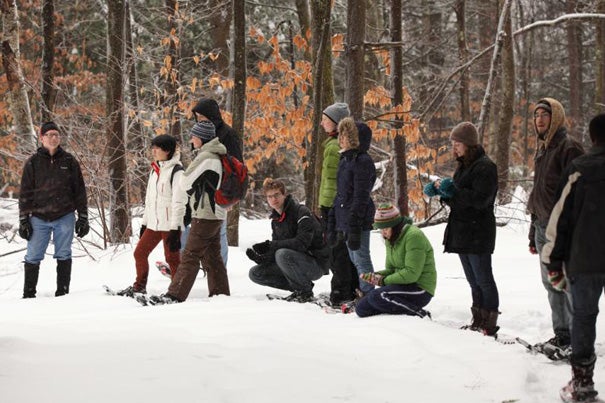
Last winter, the January Innovation Fund supported a group of 10 undergraduates from a range of concentrations to attend a Harvard Forest course in Petersham, Mass. The students strapped on snowshoes to explore beaver lodges, learned about local botany, and pulled an icy sample from a frozen bog for a hands-on lesson in “paleoecology.”
Photos courtesy of the Harvard Forest
Faculty invited to seek January grants
President’s Innovation Fund aims to build on past success
Harvard faculty may want to start thinking about winter this summer: The President’s January Innovation Fund for Faculty begins accepting new applications on Sept. 1.
Launched last year, the fund provides grants to faculty across Harvard to develop and implement creative learning experiences for students during Winter Break. Many of the programs supported in the fund’s first year involved interdisciplinary experiences led by faculty from more than one School, the kind of collaboration that President Drew Faust wants to encourage across campus.
“The creativity and depth of the programs proposed in the January Innovation Fund’s inaugural year were impressive,” said Faust. “The experiences supported by the fund involve small cohorts — often 10 students or fewer — so they provide opportunities for increased interaction with faculty, often outside the classroom.”
Faculty throughout the University may apply for funding, but on-campus proposals that target undergraduates must be limited to Optional Winter Activities Week (OWAW), Jan. 13-22. (Off-campus programs may extend over the entire Winter Break period.)
“The programs supported by the January Innovation Fund are a key component of OWAW,” said Harvard College Dean Evelynn M. Hammonds, the Barbara Gutmann Rosenkrantz Professor of the History of Science and of African and African American Studies. “Faculty-led learning experiences complement the student-led activities that are at the heart of the week’s programming. I look forward to seeing the proposals for Winter Break 2012.”
In general, the fund gives preference to proposals that emphasize innovative methods and models of teaching and learning, interdisciplinary work, research, international experiences, or public and community service. Large-scale programs involving significant costs are most likely to be successful if they are co-funded with other sponsors. All proposals must have a faculty sponsor, and award winners are required to submit a summary report that evaluates the effectiveness of the program in meeting its goals.
Applications should include a description of activities, a budget, information on the cost of student participation, and letters of commitment from participating faculty. The deadline for submission is Sept. 21, with notification of funding beginning Oct. 24. Faculty are encouraged to visit the fund website for a complete description of the program, the application process, and the criteria for selection.
Last winter, the January Innovation Fund for Faculty supported 12 programs, including a study of public health in Brazil, a course on human rights in Ghana, and geology fieldwork in the Grand Canyon. Another program took students to Washington, D.C., to participate in an Ethiopian Christmas celebration at the largest Ethiopian Orthodox Church outside the African nation.
Closer to home, the fund supported a preparatory course to conduct qualitative research in communities in the United States and abroad, an investigation of shelters and lifting devices in disaster relief efforts, and a workshop on mapmaking, spatial analysis, and spatial thinking. The program also funded an innovative course on reading and conserving the New England landscape, held at the 3,500-acre Harvard Forest in Petersham, Mass. For six days, a group of 10 undergraduates from a range of concentrations strapped on snowshoes to explore beaver lodges, learn about local botany, and pull an icy sample from a frozen bog for a hands-on lesson in “paleoecology.”
“The students brought a range of perspectives to the course activities,” said Clarisse Hart, outreach and education manager for the Harvard Forest. “From social studies to organismic and evolutionary biology, you could see the threads of their Harvard education showing up in the creative work that they did.”
Jelle Zijlstra ’13 concentrates in folklore and mythology, but has an interest in the natural world. He said the Harvard Forest course allowed him to gain some experience with field biology and to develop an appreciation of the local countryside.
“We had to walk on snowshoes all the time, a first for most of us,” said the Mather House resident. “The many long hikes through the snowy forest were amazing. I learned to understand the history of the New England landscape, a history that I was mostly unaware of.”




